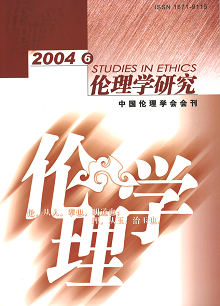|
|
On the Formative Mechanism of Moral Belief
WEI Changling
2004(6):
43-46.
The formative mechanism of moral belief includes three parts in the least:ie, the achnow ledgement mechanism of needs,the inside chang mechanism of ethical responsibility and the integraton mechanism of moral psychology. the acknowledgement mechanism of needs touches the problems of the humanity, the value of life andthe aim of the human being, etc, which are the subjective basis of theformative mechanism of moral belief. The inside chang mechanism of ethical responsibility touches the the problems of the social ethical relations of the humanbeing, the social qualification and decision, the social value, the social moral rules and moral education, which are the objective conditions of formation ofmoral belief, etc. The integration mechanism of moral psychology touches the problems of the moral perception, the moral emotions,the moral will and the moralpersonaltity, which are the dynamic unity of the subjective and objective conditions of the moral belief.
|



